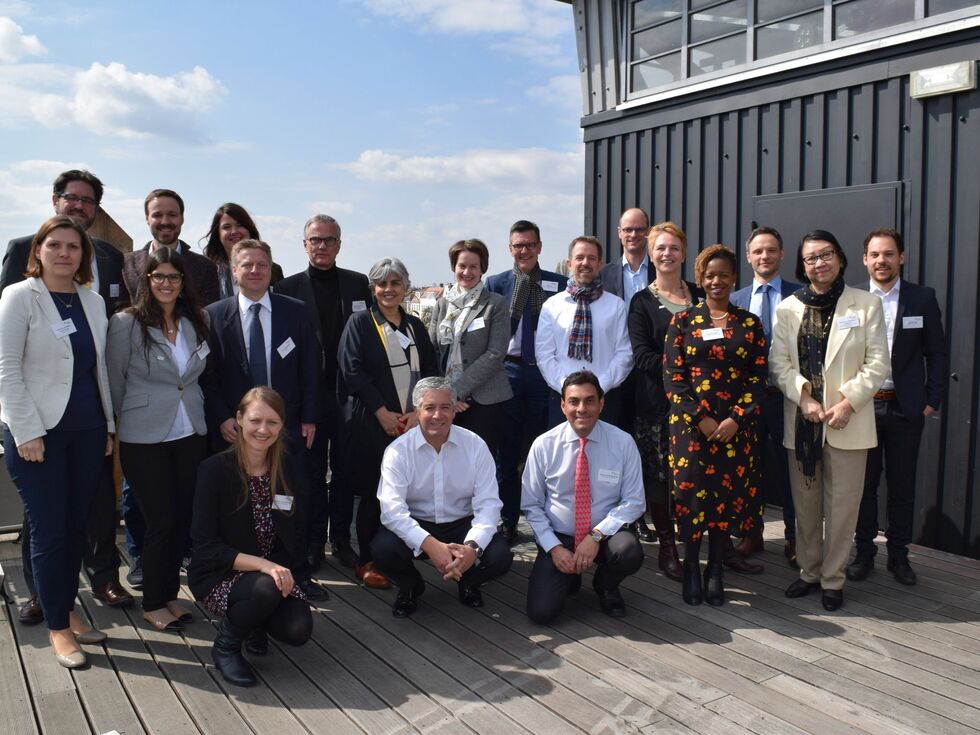Steering Committee develops a global vision at 7th meeting
11.04.2019
Berlin, Germany




On 10th and 11th April, the 7th Steering Committee Meeting of the Alliance for Integrity took place in Berlin. This time, the structure of the Steering Committee meeting was a workshop filled with lively discussions about the vision for the future of the initiative. One of the main objectives that came up in the workshop was that of the Alliance for Integrity being globally known as a game changer for anti-corruption issues. Therefore, the Alliance for Integrity plans to further enhance public-private dialogue, to make an effort to include governments in activities such as global conferences, and to work towards making collective action a norm in the field of anti-corruption.
Susanne Friedrich, director of the Alliance for Integrity, emphasised the importance of this meeting in order to develop a global Vision 2025 for the initiative. After the successful first project phase of the Alliance for Integrity, the aim is now to create a strategy and business plan for the sustainable future of the initiative. Consequently, the members of the Steering Committee reflected on the status of the initiative and looked ahead to where its activities could lead in the future.
As unique selling points of the Alliance for Integrity, the participants defined the multi-stakeholder approach of the initiative, activities in the field of public-private dialogue, and the mix of global representation with local expertise. Some of the identified challenges for promoting integrity in the economic system were the lack of resources within companies to make this topic a priority, no clarity for companies in how to measure the impact of their compliance activities, and in some contexts lack of political willingness to promote integrity. The group also collected ideas on how future opportunities to promote integrity could look like, for example the use of digital tools, the participation of universities in order to address young people and receive input from academia, as well as to focus on establishing a compliance culture within companies.
On behalf of the German Federal Ministry for Economic Cooperation and Development (BMZ), Dr. Thomas Cieslik and Lucia de Carlo participated at the workshop. Dr. Thomas Cieslik praised the multi-stakeholder approach of the initiative and emphasised the importance of collaboration with the private sector. Lucia de Carlo elaborated on how corruption and bribery hinder trade and are harmful for the local economies; therefore, capacity building in the field of anti-corruption is an important practice in order to overcome trade barriers.
On the second day of the workshop, the representatives from the countries highlighted some events and activities that happened in their regions. Among them were the successful Global Conference of the Alliance for Integrity in Mexico, the participation of the Alliance for Integrity at the German-African Business Summit in Ghana, and the interregional exchange between the Women Entrepreneurs and Professionals Working Group in Indonesia with female compliance experts from Argentina. Regarding Brazil, the year-long activity of the "Integrity Journey ” was presented and from India the decision of the Advisory Group to adapt TheIntegrityApp to the local context.
Regarding changes within the Alliance for Integrity secretariat, Carolina Echevarria was introduced as the new person responsible for the governance structure of the initiative. The Steering Committee will meet again at the end of the year and then the Sub-Committee will present its recommendations regarding the formalization of the governance structure.
The Steering Committee comprises representatives from the private sector, civil society, and the public sector enabling a multi-stakeholder approach to all the decisions made in the Alliance for Integrity. Together with the local Advisory Groups, the global Steering Committee creates the Governance Structure of the initiative. The Steering Committee meets twice a year and one of its main functions is to provide guidance for the initiative’s operations.
The organisations represented at the Steering Committee meeting were: The Basel Institute on Governance, the Federation of German Industries (BDI), the German Federal Ministry for Economic Cooperation and Development (BMZ), Grupo Toks, Indonesia Business Link, MAN SE, Merck Ghana, Merck Group, METRO AG, the Organisation for Economic Cooperation and Development (OECD), SAP SE, Siemens Mexico, Transparency International Deutschland e.V., and the United Nations Office on Drugs and Crime (UNODC).





